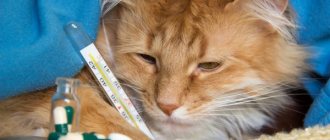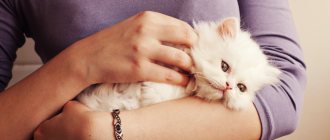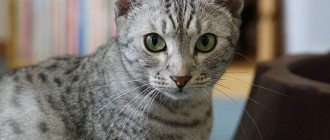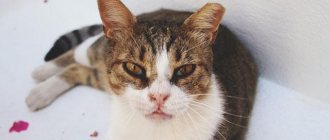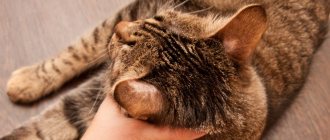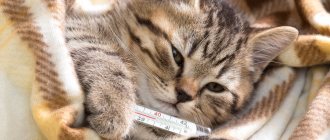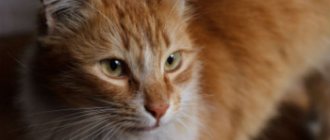False pregnancy occurs in all mammals, including humans. It happens much more often in dogs, but cat owners can also encounter this. Not so long ago, no treatment was carried out in a similar situation - the owners simply limited the animal’s food and distracted it, not allowing it to “build a nest.” Now doctors prescribe hormonal and sedative drugs to neutralize the effects on physiological processes.
What is a false pregnancy in cats?
Many cat lovers think that this phenomenon in cats is a fairy tale, because it does not occur often. So do cats actually have false pregnancies? Indeed, cats encounter it less often than dogs, since dogs in nature live in a pack. If something happens to the mother, the puppies will be fed by another pseudo-pregnant female, who has not given birth to children, but milk production is quite real.
In cats, which usually do not care about other people's offspring, this occurs as a pathological process. In a psychoneurotic state, Murka thinks she is pregnant, but you can’t count on the appearance of offspring. If a false pregnancy is observed in a cat, the symptoms of which are clearly manifested, it is better to make an appointment with a specialist in order to stop the condition and minimize unpleasant consequences.
In general, pseudo-pregnancy looks like real pregnancy with kittens: the belly enlarges, the nipples swell, and the cat expects birth. But the kittens will not appear, and this will not have the best effect on the cat.
How long does it last
The usual condition lasts about three weeks, but sometimes it lasts up to several months. How everything will proceed depends on the individual characteristics of the animal: age, temperament, health, psychological state. The longer the cat is in the “position”, the worse and more dangerous the situation and the more serious medical assistance the pet requires.
How to distinguish from the real one
If a hormonal disorder occurs without the participation of a cat or with the participation of a recently castrated male, then it is not difficult to guess that the cat has a false pregnancy. What to do if it is not clear whether mating took place? How to determine whether a cat will give birth or not? A false positive pregnancy differs mainly from a psychological point of view in the first three weeks:
- A really pregnant pet often experiences sudden changes in mood: she can be affectionate, and a second later she can get angry and attack. This happens very rarely with pseudopregnancy.
- If the female really becomes pregnant, then she nests for childbirth a few days before the event, and otherwise she looks for a place from the onset of the first symptoms. She can rummage through closets all day long and arrange the most inaccessible corners of her home.
- The postpartum behavior of an animal before birth is a clear sign of the imagination of future motherhood. She can “adopt” a slipper or a soft toy and carry this thing in her teeth throughout the house.
At two weeks, pregnancy is already determined by ultrasound, and at three, by a relaxin test, which requires blood plasma. Therefore, if in doubt, take your cat for examination to a veterinarian - he will definitely tell you whether there will be kittens in your family.
Predisposition by breed
False pregnancy can occur in absolutely any cat, but there is also a breed predisposition. Statistics show that among sphinxes, rexes and oriental breeds, every seventh individual, or about 15% of females, suffers from this hormonal disorder. Moreover, this feature is hereditary. Often the breeder prefers to sterilize the animal and not use it for breeding if false pregnancy has occurred more than two times in a row. In this case, there is a high probability that the offspring will be weak and non-viable even with a successful mating.
Why does false pregnancy occur in cats?
The disease is caused by two types of reasons - some are responsible for physiology, and others are responsible for the psyche. With a physiological mechanism, the mechanism is as follows: the animals had sexual contact, but something went wrong; Hormonal imbalances also relate to physiology. Psychological reasons are more difficult to understand, since they are unpredictable.
- The problem is with the partner
. The cat has a reproductive disorder or was recently neutered, so fertilization has not occurred, but psychologically the mechanism has started in the female.
- The problem is with the female herself.
– she, too, may not have everything in order with reproduction, this includes organ diseases and developmental anomalies.
- Hormonal imbalances
. The functioning of the endocrine system can be disrupted due to a number of diseases.
- Severe or prolonged stress
: moving, transfer to another family, long-term absence of the owner to whom the pet is strongly attached, if it is lost, etc.
- The presence of other pregnant females nearby
, even a different type. A kind of “envy” can provoke the manifestation of signs that lead the pet to the desired state, even if only in her imagination. Therefore, owners of several females need to be attentive to all if one of them is mated.
Regardless of the reasons that caused false pregnancy in cats, the symptoms and treatment will be similar in all cases.
Causes
The onset of an imaginary pregnancy is noticed in the interval from 4 to 8 weeks after a real, supposed mating or estrus that did not end with copulation. There are the following reasons for the development of anomalies:
- Mating with a castrated or infertile cat. Fertilization did not take place, but the mechanism of bearing kittens was started.
- The cat is infertile due to congenital anomalies, thyroid diseases, hormonal imbalances that developed for unknown reasons.
- There is a pregnant cat nearby. Out of envy, the pet imitates its happy companion.
- Artificial stimulation in the feline community. Grown-up kittens from other mothers attach themselves to the nipples of single cats.
- Consequences of stressful situations: moving, changing owners, conflicts with other relatives or dogs.
Symptoms of false pregnancy
The picture of the disease consists of physical symptoms that appear due to the fact that the brain gives the body incorrect signals, and from subjective behavioral signs. Based on their combination, the owner can notice something is wrong and contact a specialist.
Physiological signs
The physiology of pseudo-pregnancy is not much different from the physiology of a really pregnant mustachioed lady. If there is a false pregnancy in cats, the signs will be as follows:
- mucous discharge from the vulva;
- some bloating;
- swelling of the nipples and possible separation of colostrum;
- increased appetite;
- nausea, vomiting, diarrhea;
- rise in body temperature.
Symptoms may be present together or separately. Some “pretenders” tolerate this condition easily and practically do not “weird” in terms of behavior, and in some it reaches serious mental disorders.
Behavioral signs
They appear if false pregnancy in cats is complicated. Signs of the behavioral spectrum:
- mood swings sharply;
- change in habitual behavior: wild harpies may begin to show irrepressible love, and tame purrs, on the contrary, hiss and run away;
- apathy towards games;
- drowsiness;
- nesting;
- imitation of parenthood: carrying small objects, trying to breastfeed them and other symptoms of “adoption”.
If this behavior, coupled with physiological manifestations, continues, contact a specialist to select treatment.
Diagnosis at home and at the veterinarian
If owners notice that a false pregnancy has occurred in cats, it is better to double-check the symptoms and treatment at the veterinary clinic. If there is no mating, do not hesitate to consult a doctor. If the female tolerates the condition easily, her behavior does not change, you can wait a couple of weeks - most likely, the signs will go away on their own. If the mental state of the imaginary pregnant woman is severe, it is better to take her to the veterinary clinic as soon as possible.
After a mating has occurred, the symptoms are quite expected, and the doctor will be able to confirm the presence or absence of a special situation in 2-3 weeks using instrumental methods.
Symptoms
With a false pregnancy, the following pathological symptoms develop:
- Behavioral: lethargy, drowsiness, irritability. Before an imaginary birth, the cat becomes sociable or, conversely, aloof. It begins to nest, that is, scurry around in search of a den. Prefers the inside of cabinets. Postpartum behavior involves searching for young. The female mistakes soft toys for kittens and begins dragging them from one place to another.
- Physiological: vaginal discharge appears, which the cat carefully licks. The belly enlarges, the nipples swell, and milk is produced. The pet becomes voracious, then digestive disorders begin. The cat refuses to eat. Mastitis and genital pathologies develop.
Most often, refusal to eat, as well as lack of stimulation of the mammary glands, leads to cessation of lactation and recovery. If this is not the case, the problem is solved with the help of a specialist.
Treatment of false pregnancy in cats
A sick dog will be prescribed treatment, but the owner is also able to alleviate the pet’s plight. More recently, no drug therapy existed, and animals were not treated at all or folk remedies were used.
What should the owner do?
How to calm a pseudo-pregnant woman at home in order to avoid drug treatment if possible?
- it is advisable to switch the pet completely to drying during this time if it is on mixed feeding;
- if the cat eats natural food, completely remove dairy products from the diet, reduce protein (meat, fish) and increase the proportion of carbohydrate foods (porridge, cereals) - to prevent lactation;
- with water there are no clear recommendations: some veterinarians recommend reducing the amount of water, while others do not limit access to it;
- Show more attention to your pet: pick it up, stroke it, play, talk;
- remove objects of care and dismantle “family nests”.
If a really pregnant dog or cat lives nearby, it is better to separate the females at least into different rooms, or better yet, temporarily house them.
What medications will the veterinarian prescribe?
If, despite all the measures taken, the cat’s false pregnancy does not go away, treatment and medications should be prescribed by a veterinarian. Typically this is the following list of drugs:
- sedative therapy in the form of mild sedatives, such as “Antistress”, “Xyzalin”;
- Hormone therapy is carried out for long or frequent false pregnancies and always for mastitis;
- vitamin and mineral complexes are prescribed to maintain immunity and normal functioning of the body;
- Antibiotic therapy is required for mastitis.
In the early stages, treating false pregnancy is much easier and safer for the cat’s body, so do not delay your visit to the clinic.
Folk remedies
If milk is not produced, but your pet has severe nipple swelling, you can alleviate her condition by applying a compression bandage soaked in cabbage juice or aloe leaf pulp. A gentle massage of the mammary glands helps a lot, in which it is better to use special means to stop lactation - gels, ointments, creams. But you cannot self-medicate mastitis, therefore, if symptoms of inflammation suddenly appear, you should consult a doctor.
What to do and how to calm your cat
Unlike dogs, for which false pregnancy is a natural physiological process, pseudo-pregnancy for a cat can be called a serious disorder and pathology. What to do and how to calm a cat? How to help your pet overcome this condition?
Important! If you notice signs of “spooning”, we recommend contacting your veterinarian. You may need conservative drug treatment, which the veterinarian will prescribe, taking into account the individual characteristics of your pet’s body.
To help your cat recover faster and get out of this state, provide her with the most comfortable living conditions and proper care. Do not scold or punish the animal under any circumstances, since the female cannot control her natural urges.
First of all, review your diet. Reduce portions slightly, completely exclude fermented milk, dairy products, as well as protein-rich foods. Food during this period should be easily digestible and not too high in calories. If your cat is kept on a prepared diet, choose products labeled “light”.
To reduce milk secretion, reduce the amount of water and fluid intake. Eliminate wet food, broth-based cereals, and soups from your diet. You can give your cat water no more than three times a day; give water in small portions.
Remove toys and personal items that the cat mistakes for its “cubs.” Surround your pet with attention, affection, and care. Play with your pussy to distract her from caring about her imaginary “offspring.”
Make sure your cat doesn't lick your nipples. Tactile stimulation enhances lactation. Don't express milk. Put a blanket and an Elizabethan protective collar on the cat. Do not use bandages that are too tight, as this may lead to mastitis.
Possible complications
The state of pseudopregnancy in itself is not scary for an animal. The danger is caused by serious complications, which in severe and advanced cases can lead to the death of the pet.
Mastitis
The production of milk in a mother who is going to feed her offspring is quite physiological. But the birth of kittens is not expected, and lactation has started, producing empty milk that does not go anywhere. If you do nothing to help the mammary glands avoid stagnation, then you are not far from mastitis - an infectious-inflammatory, often purulent process. It must be treated with antibiotics, and in difficult cases, a unilateral or bilateral mastectomy (removal of the entire strip of mammary glands) can be performed.
Pyometra
Pseudopregnancy can also cause a disease such as pyometra - inflammation of the uterus with the accumulation of purulent contents in it. Conservative drug treatment is possible only in the initial stage of the disease, but most often, in order to save the animal’s life, surgical removal of the uterus and ovaries is performed.
Severe psychological condition
Often the psychoneurotic reaction of the central nervous system depresses imaginary expectant mothers and causes serious mental disorders that can be dangerous for people. Murki can seriously protect their newly-made “children” from attacks, rush at their owners, scratch and bite. They are able to turn their anger on the home environment, causing serious damage to furniture, wallpaper and other surfaces in the house. Such furies must be prescribed sedative therapy, and you should not wait 2-3 weeks and hope that everything will go away on its own.
Treatment, drugs
In severe cases, if an imaginary pregnancy has developed against the background of endocrine and hormonal changes, a veterinarian should provide assistance to the animal. Cats are prescribed sedatives to normalize their emotional state (Cat-Bayun, Fitex, Anti-stress), and decoctions of medicinal herbs (motherwort, chamomile, sage).
Hormone therapy is being carried out. Naloxone and Cyclozocin are administered orally twice a day. The dose is calculated based on the pet’s weight (0.01 mg per kg of body weight), but it is still better if the dosage is prescribed by a veterinarian. The drug “Galastop” (solution for oral use) helps well with “spooning”.
For endocrine and other pathologies, symptomatic therapy and homeopathic medicines are used. For inflammation of the uterus - antibacterial agents. If mastitis has developed - ointments, gels that have anti-inflammatory, analgesic, antibacterial, decongestant effects, drugs that block the activity of prolactin. The preparations are lubricated two to three times a day on the cat’s mammary glands.
Treatment is carried out until the cat’s condition is completely normalized and all symptoms of an imaginary pregnancy are eliminated.
Sterilization and its connection with false pregnancy
Sterilization, that is, removal of the uterus and ovaries, is a radical way to combat false pregnancy. The necessary hormones are not produced, and the condition becomes impossible, so frequently recurring similar hormonal disorders are a clear indication for sterilization. If the individual is a breeder, it is not at all necessary to sterilize it after the first unsuccessful mating; first you need to try to find out the cause of the problem. Perhaps, after a change of partner or after treatment, the pet will be able to have offspring, and the disease will not recur.
Surgery is recommended if the owner does not intend to breed the pet - after sterilization, the pet will be free from diseases of the reproductive system in the future, and, perhaps, will live several more years of life.
Prevention
To prevent the development of dangerous diseases of the reproductive system and psyche of your pet, you should take into account a number of tips from veterinarians:
- It is best to breed a cat only to a cat that has a good “reproductive reputation.” You need to select for mating a male that has repeatedly produced healthy offspring;
Mating should be carried out only with proven males
- You should not keep a pet together with a cat that already has offspring. An “example” in the form of a female with kittens can affect the psyche of an animal without newborns;
- If after several matings the cat does not produce offspring, you need to show it to the veterinarian. Often unsuccessful matings indicate the presence of diseases in the female’s body, or a series of miscarriages that occurred in the early stages of pregnancy.
Unsuccessful matings are a good reason to have your cat examined by a veterinarian
Attention! The pet must also be protected from stress. You should not keep him near hostile animals, deprive him of attention, etc.
Caring for a future mother cat
If in dogs the nutritional needs during pregnancy change only by the second month, then in cats it changes immediately. They need more calories, nutrients, vitamins. Having noticed the first signs, it is advisable to increase the portion. The specific food is high in calories and contains a sufficient amount of fatty acids due to Omega-3 (they are required for the normal development of embryos). Biologically appropriate food SUPERPET is ideal for pregnant and lactating cats. During this period, you need to increase the daily norm by 100%.
Still, with a pregnant female you need to visit a specialist at least once. You should tell him about your diet, as well as the medications you give to your pet (for example, against parasites). Some of them lead to fetal malformations. Vaccination during this period is not the best idea, so vaccinations should be considered in advance.
While carrying kittens, the female should be calm and not stressed. If there are children in the house, you need to explain to them why you can’t cuddle your pet or play active games with her. Caring for a pregnant cat should not be too intrusive - the animal must be handled with extreme caution. Exhibitions, travel, and flights will clearly not benefit the tailed one.
You can’t squeeze a cat in a position; a miscarriage may occur.
What to do
The animal needs to be examined. After diagnosing that a cat has a false pregnancy, measures need to be taken. Sometimes care and a change in diet are enough for her to return to normal life in a month.
It is necessary to reduce fluid intake and avoid fermented milk products. They promote milk production. Remove all objects that evoke maternal feelings in the cat.
Spend more time with the cat, distract it with games, pet it, show care. Perhaps the lack of attention from the owners was caused by nervous stress, and the cat began to develop a false pregnancy. It will gradually calm down, hormonal levels will normalize, and the body will understand its mistake.
In a cat, a false pregnancy can cause a number of complex pathologies - mastitis, inflammation of the uterus, ovaries, suppuration of the mammary glands, thyroid tumor; it is worth carefully examining the animal. Serious therapy may be required.
